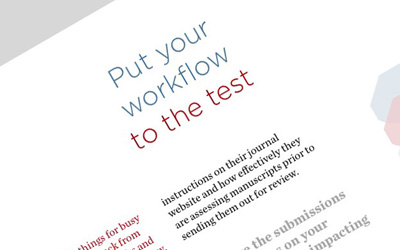
Are you ready for all the possibilities 2016 will bring your academic journal? We can’t wait to share them on the Scholastica blog!
Before we ring in the New Year, we wanted to take a look back at the 10 most popular peer-reviewed journal posts from the blog in 2015. Here’s the academic publishing and peer review management news and tips that got the most attention this year:
1. How to Write a Humane Rejection Letter: Advice from a Journal Editor
Most editors like rejection letters about as much as authors — they don’t. As an editor, whether responding to desk-reject submissions or to submissions that have gone through rounds of peer review, finding the best way to frame manuscript rejections isn’t easy. Anita Harris, managing editor of SubStance: A Review of Theory and Literary Criticism, shares tips on how to write constructive rejection letters that authors may even thank you for.
2. How to Write Helpful Peer Review Comments
Somewhat akin to the challenge of writing humane rejection letters is the art of writing helpful peer review comments. Reviewers must strike a balance between being critical but kind and being sure to offer adequate context for the author. It’s a lot to accomplish, especially when pressed for time. We’ve rounded up some great advice from scholars around the web to help.
3. Redefining Knowledge in the Digital Age: Interview with Cristóbal Cobo
Technology is rapidly changing the way researchers find, assess, and disseminate scholarship in academic journals and beyond. Oxford Internet Institute researcher Cristóbal Cobo shares how the ways academics absorb and transfer knowledge are changing and his expectations for the future of journal publishing.
4. 7 Examples of Great Journal Promotion
Is your editorial team exploring new opportunities to promote your journal online? See how journals across disciplines are using social media, innovative web design, content, and events to raise awareness of their newest articles and issues.
5. 6 Steps to Help Your Journal Give Reviewers the Guidance They Need
Few journals approach peer review in the same way. Reviewers know this, and when taking on assignments from journals they’re less familiar with they tend to have a lot of questions. Rather than leaving your reviewers to figure out what’s expected of them, you can improve their experience working with your journal and speed up peer review by providing clear guidelines.
6. The Open Access Stories: Stevan Harnad, OA Pioneer
In honor of International Open Access Week 2015, the Scholastica blog hosted The Open Access Stories series featuring interviews with OA supporters on how and why they are working to further the OA movement. Our interview with longstanding Green OA activist Stevan Harnad was among the most read.
7. 4 Reasons To Independently Promote Your Academic Journal
From making your content visible to a wider audience to improving your chances of attracting quality submissions, there are a lot of benefits to promoting your journal online. Here are four reasons to start independently promoting your journal and steps to get started.
8. Possibilities for Peer Reviewer Recognition
In April 2014 ORCID, F1000, and CASRAI initiated a community working group to develop a standard for peer reviewer recognition. This past July the group launched a pilot program for review citations. Laurel Haak, Executive Director of ORCID, and Alice Meadows, Director of Communications at ORCID, shared details about the program and their hopes for the new review citation standard.
9. Announcing Scholastica ArXiv integration
As we continue working to develop new opportunities for open access publishing, this year Scholastica was excited to announce our integration with electronic pre-print repository arXiv. Now journals in fields supported by arXiv can choose to allow authors to import their submissions via arXiv links.
10. The Library as a Publishing Partner
The role of academic libraries is shifting. Today, many libraries are serving as not only keepers of scholarship but also journal publishers. Mark Newton, Production Manager for the Columbia University Center for Digital Research and Scholarship (CDRS), shares his thoughts on the outlook of the role of the library in academic publishing.
What journal publishing news and tips caught your attention this year? Let us know on Twitter at @scholasticahq!








